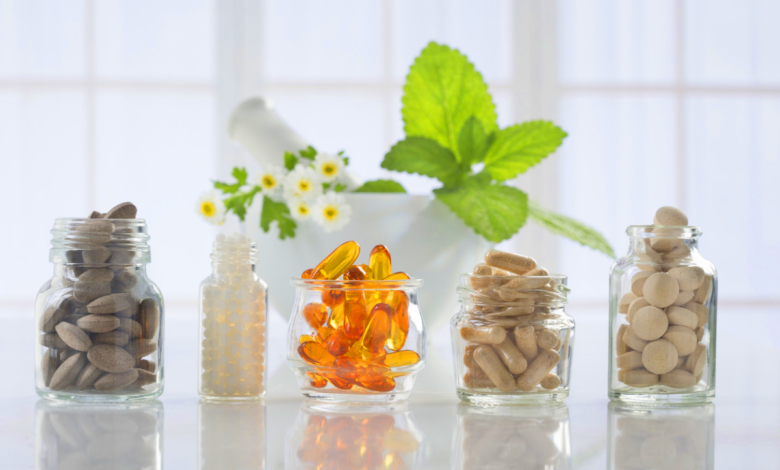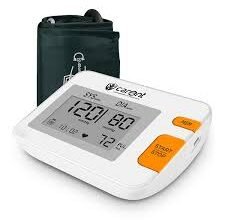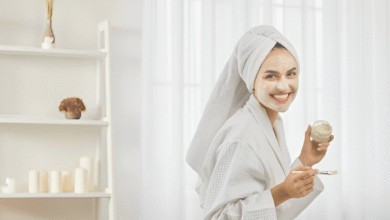Top Natural Supplements For Anxiety: Do They Work?

As the prevalence of anxiety increases worldwide, scholars are uncovering new insights into the potential significance of nutrition in relation to mental well-being, which challenges previous assumptions.
An intriguing facet of these discussions pertains to the potential soothing effects of natural supplements on anxiety. Continue reading for the most recent research and expert opinion Supplements For Anxiety , including who may benefit, who may not, and a few specific types of supplements that some individuals may find helpful.
What Is Anxiety?
Anxiety is defined by the American Psychological Association as a persistent, unmanageable sense of apprehension that fails to subside. According to the Centers for Disease Control and Prevention (CDC), around 12% of the adult population in the United States experiences recurrent episodes of concern, unease, or anxiety.
Read More : How Sleep Deprivation Affects Your Health
It is possible that you are afflicted with an anxiety disorder when these emotions become sufficiently intense and frequent to significantly disrupt your daily functioning. Anxiety disorders are the most prevalent form of mental illness in the United States, affecting forty million adults annually (19.1% of the population).
Medication, such as antidepressants, and psychotherapy, including cognitive behavioral therapy, are conventional approaches to treating and overcoming anxiety. These therapies have been scientifically validated and are the subject of extensive research to treat anxiety.
Can Supplements Help Anxiety?
Although conventional treatments can be highly efficacious, certain individuals grappling with anxiety may discover that their response is suboptimal. Antidepressants and other first-line treatments for generalized anxiety disorder are estimated to fail to produce a response in close to fifty percent of patients. Moreover, antidepressants may induce adverse effects such as lethargy, weight gain, and diminished sexual desire, which may deter some individuals from discontinuing or abstaining from their use (although it is imperative to consult your physician prior to discontinuing your medication.

An estimated forty percent of individuals experiencing moderate mental distress, which frequently encompasses anxiety, report seeking therapeutic alleviation through complementary and alternative medicine modalities, such as supplements.
Therefore, could alleviate supplements for anxiety ? The brief response is potentially, contingent upon the aetiology and intensity of the anxiety. Although it is not mandatory, it is prudent to seek medical advice prior to incorporating any dietary supplement or investigating alternative treatments.
Supplements for Anxiety: The Importance of a Personalized Approach
“Two individuals with the same diagnosis may exhibit vastly different manifestations of anxiety,” explains clinical assistant professor Ripal Shah, M.D. at the Stanford University School of Medicine. “A person experiencing stress or anxiety may primarily manifest physical symptoms (palpitations), whereas another individual may experience mental restlessness accompanied by physical calmness.”
Physical symptoms of anxiety may be alleviated by attempting a dietary supplement that targets the portion of the nervous system that regulates the “fight or flight” response. However, individuals with emotional symptoms may find this supplement ineffective.
Hence, adopting an individualized perspective is critical when examining supplements for anxiety .
What is also abundantly apparent regarding the potential role of supplements as a treatment for anxiety is that they are not a “cure-all” remedy on their own and are typically only one component of a number of lifestyle modifications designed to manage anxiety.
“Supplements will have an unintended effect if we are seeking a way to modify our brain activity without first addressing our exercise regimen, establishing a daily mind-body practice, devising a functional whole foods dietary strategy, and other relevant factors,” explains Brent Bauer, M.D., director of the Mayo Clinic Complementary and Integrative Medicine Program.
“I advise my patients at all times that supplements are supplementary.” “We may consider supplementation if there is a vitamin deficiency; however, taking unnecessary and/or multiple supplements may carry risks,” adds Michelle Loy, M.D., an integrative medicine physician affiliated with the Integrative Health and Wellbeing Center at Weill Cornell Medicine.
With all that being said, dietary supplements for anxiety may be beneficial for some people, especially for individuals who:
- Have a known nutrient deficiency
- Have mild and only occasional symptoms
- Are resistant to taking medication
- Haven’t responded to other traditional therapy
Who Should Avoid Supplements for Anxiety?
Before beginning any new anxiety-relieving supplement, it is critical to consult with a licensed and knowledgeable medical professional, according to the consensus of experts.
“Anything with the capacity to produce a positive impact must also be capable of producing a negative impact,” explains Dr. Bauer.
There are potential side effects and even dangers to taking supplements for anxiety for the following people:
- People taking certain medications that might interfere or interact with certain supplements.
- People with other mental health conditions or medical conditions, where supplementation may make existing stress and anxiety-induced symptoms worse or cause new symptoms.
- People with severe anxiety who need access to immediate treatment.
- People who are pregnant or breastfeeding (unless they talk to a doctor first).
“Before considering supplements for anxiety , I advise my patients to engage in a variety of mind-body practices (nutrition, exercise, and so forth) for a minimum of three months in my personal practice,” Dr. Bauer explains.
Top Supplements That May Help Ease Anxiety
Numerous dietary supplements make claims of alleviating anxiety. Although locating the ideal one may involve some trial and error, it is always advisable to seek the guidance of a medical professional.
Dr. Bauer states, “If a patient is contemplating the use of a dietary supplement, we examine the established benefits and risks before scanning a database for known drug interactions with their current medications.”
A few common supplements that may help ease anxiety include the following.
Ashwagandha
It has been demonstrated that ashwagandha, an Ayurvedic herb that may be particularly beneficial for those suffering from anxiety and insomnia, enhances sleep quality and stress resistance. Additionally, it is a herb that Dr. Loy endorses.
Recent evaluations concerning the safety and effectiveness of ashwagandha in the treatment of anxiety indicate that although the results are predominantly favorable, the sample sizes of the studies involved are limited. Further investigation is required to determine the optimal dosage and duration of ashwagandha supplementation in place of or in conjunction with conventional therapies.
L-Theanine
L-theanine, a compound derived from plants, is frequently detected in tea leaves. “Some studies support the notion that L-theanine induces sleep, while others contradictory findings regarding its effect on anxiety,” explains Dr. Shah.
A comprehensive analysis of studies published in Pharmacological Research in 2022 revealed that the groups administering L-theanine did not experience a statistically significant improvement in anxiety treatment when compared to the control group. Nonetheless, a 2015 study published in the Journal of the American College of Nutrition provides evidence that L-theanine aids in enhancing the quality of sleep; therefore, those who struggle with sleep may find this supplement beneficial.
Magnesium
In conjunction with other vitamins such as zinc or vitamin B6, recent clinical studies indicate that magnesium supplementation may be an effective treatment for alleviating anxiety in a variety of populations, including agitated adults, individuals with type 2 diabetes, and those with heart disease. Moreover, a significant proportion of the American population suffers from this mineral deficiency and frequently fails to consume sufficient amounts through their diet.
In regard to universally applicable recommendations for magnesium supplementation in the treatment of anxiety, further research is required. “At this time, the available evidence regarding the relationship between magnesium and anxiety is limited and inconclusive,” explains Monique Richard, an integrative dietitian and spokesperson for the Academy of Nutrition and Dietetics in the national media.
Vitamin D
As stated by Dr. Loy, although limited research has suggested the potential advantages of vitamin D supplementation in alleviating symptoms of anxiety or depression, the scientific consensus remains at odds on the matter.
Regarding the effects of vitamin D supplementation on individuals of various ages and anxiety varieties, for instance, further investigation is required. The efficacy of supplementing vitamin D with additional nutrients, such as omega-3 fatty acids or vitamin B6, is also being investigated by scientists.
Vitamin B6
A randomized controlled trial published in Human Psychopharmacology in 2022 assigned 478 young adults, the majority of whom were female, at random to receive either lactose tablets, vitamin B6 tablets, or vitamin B12 tablets for a duration of one month. Those in the group that took a high dose of vitamin B6 supplements for anxiety reported a decrease in anxiety .
Nevertheless, a prior examination from 2019 concluded that B vitamins lacked a discernible impact on anxiety as a whole . Collectively, these two studies demonstrate the need for additional research on the relationship between B vitamins and anxiety, particularly B6.
CBD
CBD is a bioactive compound derived from plants and is present in the cannabis plant. One of the primary justifications cited by individuals for utilizing CBD is for the perceived relief of anxiety.
The scientific evidence, however, regarding the effects of CBD on anxiety remains extremely limited.
It is noteworthy that a modest 2021 study published in Psychopharmacology investigated the factors that could account for the self-reported efficacy of CBD in alleviating anxiety, in spite of the contradictory and limited scientific evidence to support this claim.
In two potential sessions, 43 otherwise healthy adults were assigned at random by the researchers to receive CBD-free hemp seed oil. In the first (expectancy condition), they were informed that it contained CBD; in the second, they were informed that it did not.
Those participants who held the most firm convictions prior to the study regarding the potential of CBD to alleviate anxiety also reported a reduction in anxiety while taking the CBD supplement as anticipated. In this study, researchers successfully established that the reduction in anxiety symptoms was attributable to a “placebo effect” rather than CBD.
A 2019 tiny study, on the other hand, discovered that CBD supplementation did, in fact, alleviate anxiety in 79% of the participants.
These two contradictory studies, similar to many of the other supplements discussed in this article, demonstrate the need for additional clinical trials concerning CBD and anxiety.
Other Supplements for Anxiety
There are many other supplements marketed towards easing anxiety, including:
- Chamomile
- Lavender
- Lemon balm
- Kava kava
- Passionflower
- Omega 3 fatty acids
Richard explains that “simply seeing it advertised or on store shelves does not necessarily imply that it is a viable option for your specific requirements.”
For assistance in sifting through the contradictory and confusing information surrounding the safety and efficacy supplements for anxiety , it is advisable to consult a medical professional, such as a registered dietitian nutritionist (RDN) or an integrative or functional medicine practitioner, who specializes in determining which supplements may be optimal for an individual.
What to Look for When Choosing a Supplement for Anxiety
Third-Party Testing
“Because supplements are not FDA-regulated, it is in the best interest of the consumer to conduct adequate research before consuming any product,” advises Richard.
Assuring that the supplement has undergone independent verification or testing, distinct from that conducted by the supplement manufacturer, is an additional method of obtaining information regarding the supplement’s ingredients list’s accuracy and efficacy, as stated by Dr. Shah.
Look for one of the following third-party seals or verifications on the bottle or within materials accompanying a supplement:
- NSF International
- US Pharmacopeia (USP)
- Consumer Labs
Another consideration is the supplement brand’s level of transparency. “I advise brands to select Certificates of Analysis (CoA) that verify the purity of their supplements and indicate the origin of their herbs (in some cases, QR codes),” advises Dr. Loy. Additionally, it is advisable to ensure that the active ingredient dosage is disclosed openly and to determine whether the brand places an overall emphasis on clinically validated ingredients.
Read More : Foods That Help Fight Fatigue
There are numerous anxiety supplements, each of which is supported by varying degrees of scientific evidence regarding its safety and effectiveness. Further investigation may in the near future shed light on which supplements are truly beneficial; however, in the meantime, it is prudent to consult your physician prior to beginning a new supplement regimen.
Additionally, supplements are only one component of a comprehensive anxiety management strategy. In addition to traditional treatments, lifestyle modifications continue to be highly recommended by medical professionals and authorities. Furthermore, supplements should not be considered a substitute for anxiety medications in the case of certain individuals.
Lastly, if you are considering attempting anxiety-relieving supplements, remember that the vast majority of them are unregulated and may cause occasional adverse effects.











